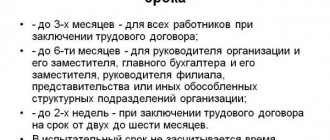In this article we will look at the probationary period in the civil service. Let's find out in what cases a probationary period is established. Let's figure out when a probationary period is not established. Let's talk about typical mistakes.
In most cases, appointment to the civil service occurs on the basis of passing a competition, but its results do not guarantee the applicant for the position his acceptance into the service. Upon completion of the selection process, the candidate must also successfully complete a probationary period and then certification. The exam will be followed by advanced training and retraining.
During the screening of a new hire, it may be discovered that the candidate does not meet any requirements or does not have sufficient professional skills to fill the desired position. In this case, he will be dismissed from the civil service. A civil servant may also make an independent decision to resign even before the end of the test.
Test condition
The methodology is essentially a new unified test procedure for civil servants of federal authorities. From 24 January 2021, they must take a common approach to all stages of the trial, from organizing the trial to consolidating the trial results.
The test is set for:
- checking the suitability of a civil servant for the position being filled in the civil service;
- confirmation of the ability to apply existing knowledge and skills when performing duties;
- assessment of his professional and personal qualities.
The probationary condition automatically included in the service contract on the basis of clause 1, part 4, art.
24 of the Federal Law “On the State Civil Service of the Russian Federation”.
In what cases is a probationary period established in the civil service?
When entering the civil service, a contract is concluded with a citizen. In the text of the contract itself and in the act of appointing him to any position, a clause is stated on the mandatory completion of a probationary period , during which the suitability of the position will be determined. Throughout the test, the manager will pay attention to the level of professional training and business qualities of the hired employee. Read also the article: → “We calculate the length of insurance for sick leave: an example of calculation”
The photo shows a service contract
If the contract did not contain a clause on passing tests, the employee is considered hired without any conditions , and it will be impossible to fire him for inadequacy for the position held.
The manager has the right to appoint a probationary period in the following cases:
- the candidate was hired by transfer from another government agency (the probationary period for him is assigned from 1 to 6 months);
- the candidate is accepted into the civil service, entry into and release from which can occur exclusively by decree of the President or the authorities (the duration of the trial for such service can vary from 1 month to 1 year);
- the applicant for the position has previously completed such service (duration of verification - 1-6 months);
- in other situations where the law does not prohibit the establishment of a probationary period.
During the test, a civil servant has the rights and obligations approved by current legislation.
It happens that during the inspection, an employee fell ill or did not appear at work for valid reasons, the existence of which he can document. Such days are not counted in the total inspection period, and the probationary period must be extended by exactly the same number of days as the employee was not actually present at the workplace and did not fulfill official duties.
What does a civil servant do?
In addition to the fact that he is fully subordinate to the labor regulations of the government agency, the employee during the probationary period must keep records of the results of the performance of official duties in a special table (Appendix No. 1 to the Methodology).
If a government agency uses a system for automatically recording orders, then there is no need to fill out the table.
The period of probation does not include periods of temporary incapacity for work and actual failure to perform official duties.
When a probationary period is not established in the civil service
In the following cases, a probationary period cannot be assigned:
- for civil servants who are guaranteed at the legislative level to retain their jobs (mothers who have a child under one and a half years of age in their care, pregnant women);
- newcomers with relevant qualifications and experience who received a position due to the reduction of a previous position;
- persons who have graduated from a specialized secondary or higher educational institution in preparation for the civil service;
- employees applying for a temporary position in a managerial or secondary position.
Registration of test results
The immediate supervisor or his deputy no later than 14 working days before the end of the employee’s test period must prepare a review (draft review) on the results of the test in the approved form. Comments on the draft documents prepared by the employee (if any) are also reflected in the review.
The following may be attached to the review:
- table (except for cases when a government agency uses an automatic order recording system);
- feedback on the results of mentoring (if any).
According to the review form (Appendix No. 2 to the Methodology), the reasons that served as the basis for recognizing a civil servant as having failed the test may be:
- insufficient professional level;
- improper performance of official duties (violation of established deadlines, inadequate quality of performance of duties, commission of actions that resulted in justified complaints from citizens and organizations).
No later than the next working day after the review is submitted, you must:
- acquaint the civil servant with it against his signature;
- give him a copy.
The subject has the right to send a statement of disagreement with the review or an explanatory note to the employer's representative within 2 working days after review.
The manager must submit the review to the personnel department no later than 10 working days before the expiration of the test period.
| SITUATION | SOLUTION |
| The civil servant passed the test | The feedback can include a recommendation to refer him to professional development activities. |
| Test failed | The review must indicate the appropriate reasons. HR service no later than 3 working days after receiving feedback on an unsatisfactory test result, sends it, along with attached documents, to a representative of its management. The latter has the right to terminate the contract with the employee by warning him in writing, indicating the reasons against signature, no later than 3 days before the expiration of the probationary period. |
| The employee wants to terminate the contract at his own request | Must notify a representative of the government agency’s management no later than 3 days before the expiration of the test period. |
And as is customary, the employee’s refusal to review the review and notification of an unsatisfactory test result or to receive a copy of the review should be reflected in the refusal act.
Read also
26.12.2019
Who must pass tests when entering the state civil service
Features of the test for admission to the state civil service are determined:
- Article 27 “Test in the civil service” of the Federal Law of July 27, 2004 No. 79-FZ (as amended on May 1, 2019) “On the State Civil Service of the Russian Federation” and
- Decree of the President of the Russian Federation of June 24, 2021 No. 288 “On the main directions of development of the state civil service of the Russian Federation for 2021 - 2021.”
By Decree of the President of the Russian Federation of June 24, 2021 No. 288 “On the main directions of development of the state civil service of the Russian Federation for 2021 - 2021”:
- The Government of the Russian Federation was instructed to ensure the implementation of a unified methodology for passing the test in the civil service in federal executive bodies by January 1, 2021.
Part 1 of Article 27 “Test in the Civil Service” of Federal Law No. 79-FZ “On the State Civil Service of the Russian Federation” defines:
- that in the act of a state body on appointment to a position in the state civil service and in the service contract
- the parties may provide for a trial of a citizen entering the state civil service for the first time for a duration of from one month to one year
- in order to verify his suitability for the position being filled in the state civil service.
Thus, this article of Federal Law No. 79-FZ provides for the mandatory establishment of a probationary period:
- for persons entering the state civil service for the first time.
Test periods when appointing a citizen or state civil servant to a position in the state civil service
Part 2 of Article 27 “Test in the Civil Service” of Federal Law No. 79-FZ “On the State Civil Service of the Russian Federation” defines specific test periods depending on the position being filled in the state civil service.
Depending on the position being filled in the state civil service, the test may be established:
- when appointing a citizen or state civil servant to a position in the state civil service, appointment to which and dismissal from which are carried out by the President of the Russian Federation or the Government of the Russian Federation - for a period of one month to one year ;
- when appointing a citizen who previously served in the civil service of the Russian Federation to a position in the state civil service - for a period of one to 6 months ;
- when appointing a state civil servant to a position in the state civil service by way of transfer from another state body - for a period of one to 6 months .
Test periods depending on the position being filled in the state civil service:
| Test period | Replaceable position of the state civil service | Legislative norm |
| From one month to one year | It is established when concluding a service contract with citizens entering the state civil service for the first time, unless otherwise provided by Art. 27 of Federal Law No. 79-FZ. May be established when appointing citizens or state civil servants to positions in the state civil service, appointment to or dismissal from which is carried out by the President of the Russian Federation or the Government of the Russian Federation | Part 1, clause 1, part 2, art. 27 Federal Law No. 79-FZ |
| From one to six months | May be established upon appointment to positions in the state civil service: — citizens who previously served in the civil service of the Russian Federation; - state civil servants in the order of transfer from another government body | Clauses 2, 3, part 2, art. 27 Federal Law No. 79-FZ |
Probation:
- is the most important personnel technology when filling positions in the state civil service;
- this is the traditional method that all employers use to determine the professional suitability of an employee;
- an ideal means of checking everything that interests the employer.
During the probationary period:
- it is usually possible to clearly see how the employee will behave in the long term;
- the abilities and inclinations, characteristics of temperament and motivation will appear in the new employee quite quickly;
- it becomes clear how a person fits into corporate standards of behavior, how he relates to disciplinary relationships, what his style of communication with people is.
The need for a probationary period is determined not only by the interests of the employer. The hired workers themselves see certain advantages in the probationary period. During this time, as a rule, employees have the opportunity to evaluate the new job, its conditions, the psychological situation in the team, and compatibility with the manager.
The following are not counted towards the probationary period of a state civil servant:
- period of temporary incapacity for work of a state civil servant and
- other periods when he did not actually perform official duties of the state civil service.
Part 6 of Article 27 “Test in the civil service” of Federal Law No. 79-FZ “On the State Civil Service of the Russian Federation”
Who should not pass tests when entering the state civil service
Part 3 of Article 27 “Test in the Civil Service” of Federal Law No. 79-FZ defines the category of persons for whom a test cannot be established when applying for the state civil service.
In accordance with it, the test cannot be established:
- for citizens who have received secondary vocational education under a training program for mid-level specialists or higher education in accordance with an agreement on targeted training with the obligation to subsequently undergo state civil service and who are entering the state civil service for the first time;
- for state civil servants appointed in accordance with paragraph 1 of part 1 of Article 31 “Relations related to the civil service, upon reduction of civil service positions or abolition of a state body” of Federal Law No. 79-FZ “On the State Civil Service of the Russian Federation” to a civil service position civil service by transfer in connection with the reduction of positions in the state civil service or the abolition of a state body;
- for other citizens and state civil servants for whom the legislation of the Russian Federation provides guarantees for maintaining their place of work (position).
It is also prohibited to establish a hiring test for pregnant women and women with children under one and a half years old.
Article 73 “Application of laws and other normative legal acts containing labor law norms” of Federal Law No. 79-FZ “On the State Civil Service of the Russian Federation”; para. Part 3, Part 4, Article 70 “Test for hiring”, Part 7, Article 11 “Effect of labor legislation and other acts containing labor law norms”, Part 3, Article 5 “Labor legislation and other acts containing labor law norms” Labor Code of the Russian Federation
It is inappropriate to establish a test in the case of targeted training of a specialist for a specific position in the state civil service
As follows from Part 3 of Article 27 “Test in the Civil Service” of Federal Law No. 79-FZ, the legislator considered it inappropriate to establish a test in the case of targeted training of a specialist for a specific position in the civil service.
This is due to the following circumstances:
- Part 4 of Article 25 “Validity of the service contract” of Federal Law No. 79-FZ provides for the conclusion of a fixed-term service contract in the event of filling a position in the state civil service after graduation by a citizen who has entered into an agreement on targeted training in a professional educational organization or educational organization of higher education with an obligation to subsequently passing the state civil service;
- Decree of the Government of the Russian Federation dated June 21, 2010 No. 469 “On approval of a standard agreement on targeted training between a federal government agency and a citizen of the Russian Federation...” defines the rights and obligations of the parties when concluding an agreement on targeted training, social support measures provided to a citizen in the process of obtaining an education . Targeted training of a citizen involves monitoring the passage of intermediate certifications, writing a final qualifying thesis on a topic recommended by a government agency, and completing internships in a government agency with which an agreement on targeted training was concluded. Therefore, compliance with the conditions of targeted training by both parties to the contract eliminates the need for additional assessment of the degree of compliance of the state civil servant with the position being filled. In addition, targeted training involves training a specialist for a specific position in the state civil service, with the required set of knowledge and skills.
It is inappropriate to establish a test for state civil servants appointed to a position in the state civil service by way of transfer due to the reduction of positions in the state civil service or the abolition of a state body
It also seems logical to state that it is inappropriate to establish a test for persons appointed to positions in the state civil service in connection with the reduction of positions or the abolition of a state body.
When reducing positions in the state civil service or abolishing a government body:
- public service relations with a civil servant continue
- in the case of granting a state civil servant filling a reduced state civil service position in a state body or a state civil service position in a state body being abolished,
- with his written consent of another state civil service position in the same state body or in a state body to which the functions of the abolished state body were transferred, or in another state body
- taking into account:
the level of his qualifications, specialty, area of training, length of experience in the state civil service or work in his specialty, area of training;
- the level of his professional education, length of experience in the state civil service or work in his specialty, direction of training, subject to his receipt of additional professional education corresponding to the field and type of professional service activity for the position of the state civil service.
It is inappropriate to establish a test for citizens and civil servants, for whom the legislation of the Russian Federation provides guarantees for maintaining their place of work
The test is also not established for citizens and civil servants, for whom the legislation of the Russian Federation provides guarantees for maintaining their place of work.
The Labor Code of the Russian Federation defines a number of categories of citizens for whom the guarantee of maintaining a job is legally provided:
- for the period of parental leave;
- for the period of suspension from a position based on a medical report in the absence of the position necessary for the transfer or the employee’s refusal;
- for the period of election to an elective position in the elected body of the primary trade union organization;
- for the period of absence of the athlete, coach during the term of the employment contract at the workplace in connection with travel to the location of the sports team of the Russian Federation and back, as well as in connection with participation in sporting events as part of the specified team;
- for the period of suspension of work in connection with the administrative suspension of activities or a temporary ban on activities in accordance with the legislation of the Russian Federation due to violation of state regulatory requirements for labor protection through no fault of the employee;
- for the period of an extraordinary medical examination in accordance with medical recommendations;
- for the period the employee receives vocational training or additional vocational education at the initiative of the employer;
- for the period the employee performs state or public duties in cases where, in accordance with the Labor Code of the Russian Federation and other federal laws, these duties must be performed during working hours;
- for the period of a business trip;
- for the period of annual leave;
- for the duration of the strike to the workers participating in it.
All of the above situations are associated with the temporary cessation of the employee’s functions at his main place of work. It seems justified and does not require additional legal regulation for workers to return to their jobs without a probationary period. The establishment of a probationary period must be associated with the appointment of a state civil servant to another position.
Regardless of whether the test is established or not, the civil servant is fully subject to the civil service legislation. |
The end of the test period for admission to the state civil service
After the end of the probationary period, a state civil servant is assigned a class rank, if the civil servant did not previously have one
Part 5 of Article 27 “Test in the civil service” of Federal Law No. 79-FZ “On the State Civil Service of the Russian Federation”
The procedure for assigning class ranks is defined in Article 11 “Class ranks of the civil service, class ranks of justice, diplomatic ranks” of Federal Law No. 79-FZ. State civil servants holding positions in the state civil service for a certain term of office are assigned class ranks based on the results of a qualification exam.
Exceptions to this rule are:
- state civil servants holding positions in the state civil service of the category MANAGERS, belonging to the highest group of positions in the state civil service;
- state civil servants holding positions in the state civil service category ASSISTANTS (ADVISORS), appointment to and dismissal from which are carried out by the President of the Russian Federation;
- state civil servants holding positions in the state civil service related to the main group of positions in the state civil service, appointment to and release from which are carried out by the Government of the Russian Federation.
Part 2 of Article 11 “Class ranks of the civil service, class ranks of justice, diplomatic ranks” of Federal Law No. 79-FZ “On the State Civil Service of the Russian Federation”
What to do if the test result of a civil servant is unsatisfactory
If during the probationary period it is determined that the state civil servant does not correspond to the position for which he was hired:
- the employer's representative has the right to terminate the service contract with him before the expiration of the probationary period;
- in this case, the employer’s representative is obliged to notify the state civil servant about this in writing no later than 3 days in and indicate the reasons for making such a decision.
For justified dismissal based on test results, the employer must document the fact of unsatisfactory results during the probationary period.
Such documentary facts may include:
- acts indicating that the employee failed to perform specific job duties,
- memos, witness statements.
The grounds for recognizing the test results as unsatisfactory may be not only violations of discipline by a state civil servant, requirements for official behavior, but also an insufficient level of qualifications.
The employer's representative is obliged to:
- not only warn the state civil servant about the termination of his service contract if the test result is unsatisfactory,
- but also indicate the reasons that served as the basis for making such a decision.
A state civil servant has the right:
- disagree with the conclusions of the employer’s representative regarding the results of the probationary period and
- appeal this decision in court.
Part 8 of Article 27 “Test in the civil service” of Federal Law No. 79-FZ “On the State Civil Service of the Russian Federation”
When appealing this decision in court, the employer's representative will have to prove that the state civil servant does not correspond to the position being filled:
- if a state civil servant has not committed any violations of discipline and duties established by law, it will be very difficult to prove his qualifications for the position being filled,
- since, when hiring for the state civil service, the employer’s representative had the opportunity to check his qualifications (education, work experience in his specialty, business qualities),
- and if the qualification requirements for the position being filled are met, the court will most likely support the claims of the state civil servant.
Part 9 of Article 27 “Test in the Civil Service” of Federal Law No. 79-FZ defines:
- that if the test period has expired, and the state civil servant continues to hold a position in the state civil service, then he is considered to have passed the test;
- if the employer's representative believes that the test results are unsatisfactory, the service contract must be terminated during the probationary period with written advance notice (three days).
Unlike the employer's representative, a state civil servant has the right to terminate a service contract:
- at his own request without explanation before the expiration of the trial period;
- He must notify the employer's representative about this in writing no later than three days before dismissal.
Part 10 of Article 27 “Test in the Civil Service” of Federal Law No. 79-FZ “On the State Civil Service of the Russian Federation”
If you have any questions about the violation of your rights, or you find yourself in a difficult life situation, then an online duty lawyer is ready to advise you on this issue for free.
RIGHT TO PUBLIC SERVICE
Procedure for admission to the civil service
The general procedure for admission includes the following main steps:
- Search for vacancies and clarify the list of documents required for admission to the service.
- Review of candidates by a special competition commission. At this stage, the applicant may be refused acceptance of documents on the basis of non-compliance with the qualification requirements for a specific position.
- The commission is formed by a separate legal act of the relevant body. Typically, it includes a representative of the employer, a representative of the body that supervises the service, current employees from the relevant structural unit, and invited experts (for example, researchers or university teachers).
An applicant for a position must provide the commission with:
- a statement drawn up in free form;
- your passport (its copy);
- a questionnaire filled out on a special form and a photograph;
- documents on existing education (this includes documentary evidence of advanced training, as well as information on the existing academic degree);
- work book to confirm work experience and existing skills (qualifications);
- a medical certificate confirming the absence of serious diseases or infections.
The applicant is notified of the completion of the competition by a member of the commission. After which it is necessary to submit to the personnel department of the organization the documents necessary for concluding an employment contract.
The package is formed:
- from an application containing a brief request from the candidate for employment in a specific organization;
- from a personally completed application form established by the government;
- from the passport;
- from the work book (if a person gets a job for the first time, the employer starts a book for him);
- from an insurance certificate (if employment occurs for the first time, this document does not need to be presented);
- from a document confirming the fact of registration with the local tax service;
- from documents on the education received;
- from military documents (to be presented by male applicants);
- from information about existing income, property, as well as obligations in this area.
At the next stage, a separate act is issued, which serves as the basis for concluding an employment contract with the employee. The applicant is appointed to a vacant position and assigned a class rank.
The length of service required to retire in Russia under the new law is the topic of our detailed article. Find out all the details about the increased pensions for military personnel of the Russian Armed Forces in the article. 2021 has seen important changes to unemployment benefits. Our material has all the information you need.
Common mistakes
Error No. 1: Dismissal of a civil servant due to unsatisfactory completion of the probationary period in the case where the employment contract does not indicate the appointment of a probationary period.
Comment : When the employment contract does not contain information about establishing a probationary period, it is impossible to dismiss an employee for professional incompetence - a candidate for a vacant position is automatically recognized as hired without the need to undergo testing.
Mistake No. 2: Establishing a probationary period in the civil service for a pregnant woman.
Comment : Pregnant women should be recruited without preliminary tests, since they belong to the category of employees for whom professional suitability tests are not established.
Error No. 3: Establishing a probationary period for a civil servant of 2 years.
Comment: A probationary period aimed at determining the professional and business qualities of a civil servant can be assigned for a period of 3 months to 1 year.
Error No. 4: A civil servant who did not have a rank at the beginning of his probationary period in the civil service did not receive a rank at the end of the test.
Comment : In cases where an employee who did not hold a rank prior to completion of his probationary period has received a satisfactory assessment of his fitness for duty and is hired, he should be awarded a rank.
Assessment of the business qualities of a civil servant
A direct assessment of the qualities of a civil servant is given by his immediate supervisor . This assessment is presented in the form of a conclusion.
The business and professional qualities of a civil servant are assessed by a special commission , which makes a conclusion about the possibility of holding a public office and assigning a class rank.
This commission is created from among existing civil service employees who have sufficient experience in this field and have the necessary knowledge and skills that provide the opportunity to evaluate a particular candidate.
To successfully pass the so-called “certification”, a civil servant must answer questions related to work in the civil service.









